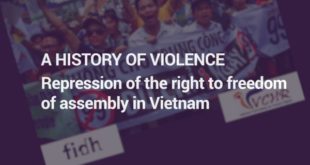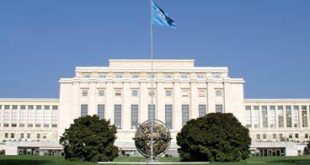The European Parliament,
– having regard to the 15th ASEAN Summit Meeting of 23 to 25 October 2009;
– having regard to the inauguration of the ASEAN Intergovernmental Commission on Human Rights on 23 October 2009;
– having regard to the EU Annual Report on Human Rights 2008;
– having regard to the ongoing negotiations on the new Partnership and Cooperation Agreement between the EU and Vietnam and to the EU-Vietnam human rights dialogue held twice a year between the EU and the government of Vietnam;
– having regard to its previous resolutions on Laos, in particular the one dated 14 November 2001 on the “arbitrary arrests and the political situation in Laos” and the one dated 1st December 2005 on “the human rights situation in Cambodia, Laos and Vietnam”;
– having regard to the Cooperation Agreement between the EU and the Lao PDR of 1st December 1997, based on “respect for democratic principles and fundamental human rights as set out in the Universal Declaration of Human Rights”;
– having regard to Article 122 of its Rules of Procedure,
Vietnam
A. whereas the Vietnamese government has refused to respond to many recommendations made during the UN Human Rights Council’s Universal Periodic Review, held from May to September 2009, in order to improve its human rights record,
B. Whereas hundreds of people are currently imprisoned in Viet Nam for their religious or political beliefs, notably Montagnard Christians, a Catholic priest, a Mennonite pastors, members of the Cao Dai faith, and Hoa Hao Buddhists
C. Whereas on 27th September 2009 hundreds of young Buddhist monks from the Bat Nha monastery were violently attacked, beaten and their monastery vandalised while the state authorities and the police ignored their plea for help; whereas other monks that found refuge in the Phuoc Hue temple were subject to physical violence and harassment by the police; whereas they are facing the risk of expulsion by the government on the ground that they have been occupying the Bat Nha monastery without permission and prior registration,
D. Whereas the assault on the monastery is considered by many to be linked to the 10-point-proposal for religious reforms which Thich Nhat Hanh had presented to the Vietnamese President Triet in 2007;
E. Whereas all religious groups must be authorised by the government and overseen by government-appointed management committees and whereas many religious organisations face ban and a persecution of its members if they wish to preserve government independence;
F. Whereas the dignitaries of the Unified Buddhist Church of Vietnam are virtually all imprisoned, starting with its Patriarch Thich Quang Do (aged 81), the most eminent of the Vietnamese dissidents, who has been detained for more than 27 years, currently in his monastery of Zen Thanh Minh in Ho Chi Minh City,
G. Whereas Ms. Tran Khai Thanh Thuy, a Vietnamese writer and a leading figure in the movement for democracy in Vietnam has been arrested again after serving a nine-month imprisonment in 2007; whereas she suffers from severe diabetes while the Vietnamese authorities refuse to release her on bail or to allow her to receive any medication,
H. whereas several prisoners of conscience, including Nguyen Van Ly, Le Thi Cong Nhan, and Nguyen Binh Thanh, all sentenced for “propaganda against the government of the socialist Republic of Vietnam” have been denied proper medical care in prison while their health condition requires an immediate hospitalisation,
I. Whereas in absence of independent human rights organisations, Church leaders often take on the role of human rights defenders fighting for more tolerance and democratic principles;
J. Whereas Vietnam, which will assume the chair of ASEAN in 2010, should set an example by improving its human rights practices. The government could start by releasing the hundreds of peaceful government critics, independent church activists, bloggers, and democracy advocates imprisoned in violation of international law on groundless national security charges for expressing peaceful dissent,
Laos
K. whereas on 29 September 2009 the Lao People’s Democratic Republic ratified the International Covenant on Civil and Political Rights, which guarantees in particular the people’s right to freedom of faith, freedom of association, freedom of speech and of the press, as well as the right to demonstrate and political rights,
L. Whereas almost one month after the 10th anniversary of the “26th October 1999 movement” launched by students and teachers of Vientiane, the main leaders of the movement – Thongpaseuth Keuakaoun, Seng-Aloun Phenghphanh, Bouavanh Chanmanivong and Kèochay – are still held in secret detention, while according to reports Khamphouvieng Sisa-At has died in prison in uncertain circumstances;
M. Whereas on 2 November 2009 more than 300 people, who were preparing for a peaceful demonstration in Vientiane, in order to demand respect for human rights and a multiparty system in memory of the 10th anniversary the crack down, were apprehended by the secret police of the Lao People’s Democratic Republic, and that nine of them – Ms Kingkèo and Ms Somchit, Messrs. Soubinh, Souane, Sinpasong, Khamsone, Nou, Somkhit and Sourigna – are still held in custody,
N. Whereas Laos continues to persecute Hmong communities because of a Hmong insurgency that dates back to the 1960s, including through arrests, torture, sexual abuse, and extrajudicial killings of Hmongs living in areas of Laos suspected to be insurgency regions;
O. Whereas 5,000 Lao Hmong are currently detained in Huay Nam Khao Camp in Thailand and subject to deportation as a result of an agreement between the governments of Thailand and Laos and another 158, including 85 children, have been detained in abusive conditions for over three years in Nongkhai;
P. Whereas there is concern about the general political situation in Laos, which has been ruled by a single party in power since 1975 and whose population continue to be deprived the basic human rights;
Vietnam
1. Urges the government to cease all forms of repression against those who exercise their rights to freedom of expression, freedom of belief and religion , freedom of assembly in accordance with international human rights standards and the Vietnamese Constitution; calls upon the Vietnamese government to respect its international obligations which implies recognition of all religious communities, of the free practice of religion and the restitution of assets arbitrarily seized by the State from the Unified Buddhist Church of Vietnam and the Catholic Church, and all other religions communities;
2. Condemns the reported violent expulsion of more than 150 monks and nuns from monasteries and that the increasingly tense situation following these actions against the peaceful Buddhist community is in clear contradiction with the commitments regarding compliance with internationally-accepted standards on freedom of religion, especially when it comes to people trying to exercise their rights, which the Government of the Socialist Republic of Vietnam has undertaken to observe as a member of the UN Security Council and future chair of ASEAN,
3. Requests that, within the framework of the current negotiations on the new Partnership and Cooperation Agreement with Vietnam, the Commission and the Council include a binding and unambiguous clause on human rights and democracy, together with a mechanism allowing for its implementation in order to put an end to systematic violations of democracy and human rights,
4. Calls for the cessation of all persecution and harassment, and for monks and nuns be allowed to practice Buddhism according to the tradition of the community of the Buddhist bonze Thich Nhat Hanh in Bat Nha and elsewhere,
5. Demands the unconditional release of Thich Quang Do and the re-establishment of the legal status of the Unified Buddhist Church of Vietnam and of its dignitaries,
6. Calls on the government to put into place an independent national human rights commission, to receive and investigate allegations of torture or other abuses of power by public officials, including members of the security services and to initiate proceedings to abolish the death penalty.
7. In view of Vietnam’s role as member of the Security Council, calls on the government to issue standing invitations to UN special rapporteurs, notably on freedom of expression, religious freedom, torture, human rights defenders, violence against women and to the UN Working Group on Arbitrary Detention;
Laos
8. welcomes the ratification of the International Covenant on Civil and Political Rights by the Laotian government; calls upon the Laotian authorities to fully respect the terms of the Covenant, to harmonise without delay Laotian law to its provisions and to practice these provisions to internationally agreed standards, notably when it comes to freedom of speech, assembly and faith;
9. Reiterates its demand for the immediate release of the leaders of the “Student Movement of 26th October 1999” as well as of all the prisoners of conscience held in Laos, and entrusts its competent EU delegation in Vientiane with the responsibility for following up this matter,
10. Calls upon the Laotian authorities to release unconditionally all those people arrested during the attempted peaceful demonstration on 2nd November 2009,
11. Calls upon the Thai authorities to immediately end the detention of 158 Lao Hmong refugees and to permit them to resettle in Thailand or in United States, Canada, the Netherlands, and Australia who have already agreed to take them.; calls equally on the Thai government to guarantee that all Lao Hmong in Huay Nam Khao Camp have access to screening and status determination procedures if they wish to make an asylum claim;
12. Calls on the Commission to closely monitor the situation of the Lao-Hmong community and the government’s programmes designed for ethnic minorities,
13. Reiterates its demand to the Laotian authorities to devise and implement as soon as possible all the reforms necessary in order to bring democracy to the country, to guarantee the right to peaceful expression of political opposition and to ensure that internationally-monitored multi-party elections take place soon, with a view to national reconciliation,
General
14. Urges the authorities to immediately and unconditionally release all human rights defenders, political prisoners and prisoners of conscience as their detention is against human rights; also requests the authorities to guarantee their physical and psychological well being in all circumstances and to offer those in need an access to a good independent professional medical care;
15. Calls on the Council and the Commission to make a detailed assessment of the implementation policies in the field of democracy and human rights conducted in Laos and Vietnam since the signing of the association and cooperation agreements and to report back to Parliament,
16. Instructs its President to forward this resolution to the Council, the Commission, the governments of the Member States, the governments and parliaments of Vietnam and Laos, the ASEAN Secretariat, the United Nations High Commissioner for Human Rights and the Secretary-General of the United Nations.
 Quê Me Quê Me: Action for democracy in Vietnam & Vietnam Committee on Human Rights
Quê Me Quê Me: Action for democracy in Vietnam & Vietnam Committee on Human Rights



